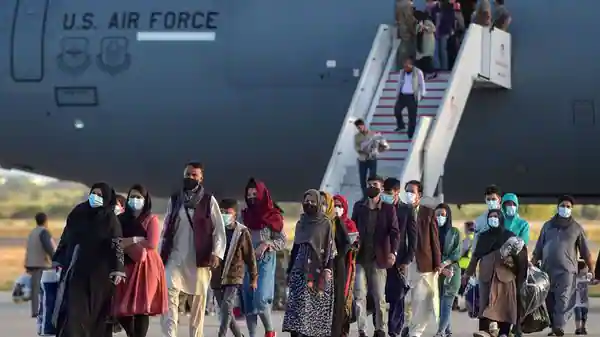Muhammad had spent his first night in America in the emergency room of a Virginia hospital, struggling to breathe. He was overcome with worry about his wife, Aliya, who was stopped from boarding their flight from Kabul because of a visa problem. With only minutes to set their course, she and Muhammad agreed to separate. He would take the children to the U.S. alone.
Leaving his wife to the chaos of the Kabul airport was hard for Muhammad, who asked that only his family’s first names be used. He learned he had suffered a panic attack. Over the next weeks, more would follow.
The abrupt separation of families is among the many challenges facing tens of thousands of Afghans as they settle in the U.S. and other parts of the world. So are new languages and customs, and the tasks of finding work, schools, transportation and housing.
“Life in America is very good. There is security. My children can have an education without fear,” said Muhammad, the family’s sole English speaker.
Yet turmoil around the move and those he left behind has surfaced in frightening emergency room episodes. “I wish I could control my mind,” he said.
Muhammad, 33 years old, worked in information technology for the U.S. military at the airfield in the city of Kandahar, his hometown.
For the past two decades, until the Taliban seized power in August, the U.S. and its allies have been the main employer in Afghanistan, hiring contractors to provide security, logistics and other military support. Muhammad’s IT job afforded him a comfortable 5-bedroom house in the city.
It also came with risks. From the start, friends warned him that working with U.S. forces made him a target of militants. He nonetheless rode to work with a friend in the army who drove a military vehicle to the American base.
One morning, he said, three men on motorcycles stopped and asked where he was going. He lied and said he was going to exchange money.
“ ‘We know everything about you,’ ” Muhammad recalled the men saying. “For 10 minutes, my body was shivering with fear.”
In 2017, he applied for a Special Immigrant Visa, known as an SIV, a program launched to shelter those at risk of reprisals for helping the U.S. in the war. Muhammad said he didn’t want to leave his home and extended family, but he worried about his children’s future in Afghanistan.
The Biden administration launched Operation Allies Refuge in July, after coming under pressure from lawmakers and veterans’ groups to speed up visa processing and begin to evacuate SIV applicants. At the time, the State Department had a backlog of about 20,000 pending applications, representing as many as 100,000 people, according to congressional officials and advocates for the families. In the rushed exit following Kabul’s collapse, the majority of SIV applicants and their families were left behind.
About 50,000 Afghan families have arrived in the U.S., where most have been housed in temporary lodging at military bases while undergoing immigration procedures.
Muhammad in his visa application noted awards he had won from U.S. officials for his years of service, along with photographs of him posing with American soldiers. He included threatening letters from the Taliban that told him to quit.
He received notice on July 22 to travel to Kabul, where he and his family waited for a flight. On Aug. 12, Muhammad and the children flew to Doha, Qatar, their first stop en route to Dulles International Airport in Virginia.
Fitting in
Muhammad and the children, ages 5 to 15, arrived at the airport in Rochester on Aug. 15, the day former Afghan President Ashraf Ghani fled the country and Kabul fell to insurgents.
He picked Rochester because he had a a long-running connection to the nonprofit group Keeping Our Promise, based in the area. Ellen Smith, the director, had been in touch with Muhammad during the SIV application process by long distance and offered to support his family once they arrived. Since 2014, the largely volunteer group has helped resettle more than 100 Afghan, Iraqi and Kurdish families in Rochester—totaling nearly 400 men, women and children.
Ms. Smith was waiting at the airport for the family. After landing, Muhammad again felt his heart racing. He felt like he was choking and had trouble breathing. They went to the hospital, and doctors prescribed medication for anxiety.
That same day, Aliya learned her visa was ready. She made it through Taliban checkpoints in Kabul and flew via Qatar to the U.S., aided by other Afghan families and the United Nations International Organization for Migration. On Aug. 17, she arrived at the Rochester airport. For a few panicked minutes, she couldn’t find her family. She went outside and then returned inside the terminal before she finally saw them waiting for her.
Ms. Smith, a former journalist, said she helped her first Afghan family in 2014 after seeing an appeal on Facebook. Word spread, drawing more families as well as volunteers. “It was literally friends getting friends, getting friends,” she said, “and it’s still that.”
The first six to 12 months are the most intense for arriving families, Ms. Smith said. There are such logistical matters as enrolling in English courses, applying for Social Security numbers and registering children in school. There also is the challenge of fitting in.
Muhammad said he realized that many of the belongings the family brought from home were useless. No one in Rochester wore the long, loose-fitting traditional dress of Kandahar.
Ms. Smith arranged for the family to visit Saint’s Place Clothing Closet, a nonprofit that helps outfit refugees in Western attire. There, bags stuffed with American clothes and toys line the corridors. On a recent day, 5-year-old Omid picked out a plush toy from the Lion King and hugged it tightly. His 13-year old sister, Fatima, looked through fashion jewelry. Aliya tried on flowing skirts.
While his family sorted through the donated clothes, Muhammad was on his cellphone with relatives in Afghanistan. His mother, who is staying with his sister’s family, calls him every night in tears, he said. Relatives have reported that the Taliban have twice looted his house in Kandahar.
Muhammad and his family are eligible for government benefits typically granted refugees admitted to the U.S., including help finding and furnishing a home, as well as several months of healthcare and financial assistance to buy food.
Some of the work is carried out by nonprofit groups, including the Catholic Family Center, which helped move Muhammad and his family to a three-story Victorian house in a part of the city where houses sell for less than $100,000.
Muhammad doesn’t like seeing men drink and smoke marijuana on the steps of neighboring houses. He said he feared letting his children play outside. His wife shares those fears but has no regrets.
“In Kandahar, when we sent the children to school,” she said, “we weren’t sure if they would come back alive.”
Escape guilt
Muhammad had his third panic attack on Aug. 31. That day the last U.S. troops left Afghanistan, closing the door on his younger brother, Aminullah.
His brother had also worked at the U.S. military airfield in Kandahar and had been kidnapped by the Taliban in April. He survived with injuries after being freed by Afghan forces. Aminullah, also an eligible visa applicant, waited with his wife and 5-year-old son among the crowds outside the gates of the Kabul airport after militants took the city.
Muhammad was frequently on the phone with his brother and those advocating for Aminullah and family to be allowed inside the airport gates. He said he has felt responsible for Aminullah since their father was fatally shot in 2018, an attack the family blamed on the Taliban.
The guilt of leaving Aminullah behind is painful. “When my father was dying, he told me to take care of my brother,” Muhammad said. “I am also like his father now, not just his brother.”
Now, he said, he doesn’t know when they will see each other again.
Muhammad’s most recent panic attack was on Sept. 8. Aliya cried in the emergency room as the family waited. A doctor now following his case prescribed medication and referred Muhammad to a psychiatrist.
Local officials say they expect more Afghan families will need mental-health help. Nicholas Stefanovic, director of the Monroe County Veterans Service Agency in Rochester, said Afghans will be offered some of the same services used by veterans.
Ms. Smith, worried about Muhammad, asked one of the more experienced Afghan families in the city to check on him. The next morning, the father in that family awoke to missed calls from Muhammad, who had had his fourth panic attack.
Muhammad’s children are adapting more easily. They chase each other around the house and laugh. American volunteers bring their children, and they play together, despite the language divide. All of the family’s friends and relatives back home tell the kids that they are lucky to be in the U.S.
The children say they miss their grandmother and cousins in Afghanistan.
Saifullah, the eldest, is relieved to attend school without interruption from the fighting. The 15-year-old boy has seen explosions and heard gunfire. In Kandahar, he said, “there was no education or future for me.” He plans to follow in his father’s footsteps and study to be a computer engineer.
“I want to be an engineer!” 11-year old Rahmatullah said, and his sisters laughed. Fatima wants to be a teacher; 8-year old Amina wants to be a nurse and deliver babies. They all shout suggestions when Omid, the youngest, is asked about his plans for life in the U.S. “Doctor!” he said.
The children started school last week, and Muhammad went along to translate and help get them settled. He has his own ambitions. “I will work any line of work, as an electrician, or mechanic, and I will study hard to get an online certification in information technology,” he said, He has signed up for a class to get his driver’s license.
At home, Aliya and Fatima prepare meals laid out just as they did in Kandahar, plates of rice with stewed chicken on the side and flatbread similar to Afghan naan. A salad and tomatoes are arranged on little plates. Mandarin oranges sit peeled and quartered. The big dining table seats the entire family, though none of the donated chairs match.
Aliya worries about her husband’s health and misses home, she said, but is thankful to be in America. She can’t read or write because Taliban rule in the 1990s kept girls out of schools in Kandahar when she was growing up. Now, she said, she plans to learn English.
Never miss a story! Stay connected and informed with Mint.
Download
our App Now!!




